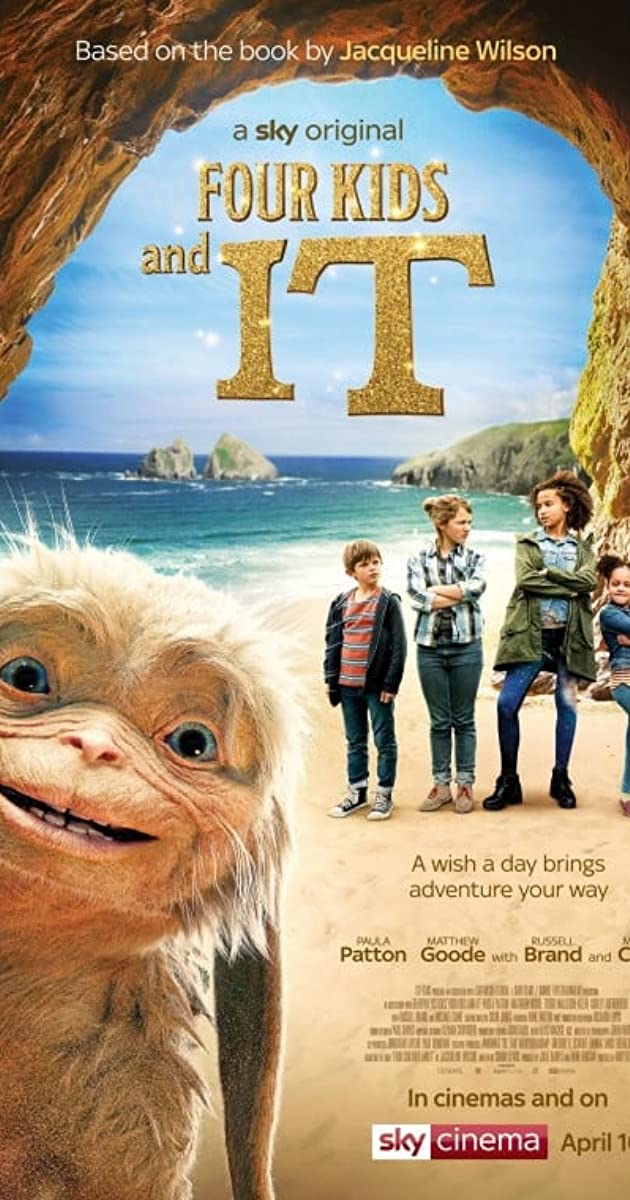Four Kids and It
Posted on June 29, 2020 at 5:37 pm
B| Lowest Recommended Age: | 4th - 6th Grade |
| MPAA Rating: | Rated PG for thematic elements, some rude/suggestive comment, fantasy violence, and language |
| Profanity: | Some schoolyard language |
| Alcohol/ Drugs: | None |
| Violence/ Scariness: | Fantasy peril and some violence, guns, explosion |
| Diversity Issues: | None |
| Date Released to Theaters: | June 30, 2020 |

Let’s get one thing clear before we talk about “Four Kids and It.” We’re going to set aside our deep affection for E. Nesbit’s book Five Children and It for a moment. That classic has at best a homeopathic relationship to this film, which is based on a sort of inspired by, sort of sequel, touch of rip-off called, without much imagination, Four Kids and It. In both cases, the story is about children who discover a magical sand-dwelling creature called a Psammead who can talk and grant wishes. And in both cases, the wishes do not exactly turn out the way the wishers hope, creating a learning experience for the wishers and some fun for the readers/audience. I’ll take a moment to warmly recommend the truly classic original, preferably read aloud and with the Paul O. Zelinsky illustrations, and get on to this far lesser but still pleasantly entertaining version.
A single dad (Matthew Goode as David) and a single mom (Paula Patten as Alice) decide for no reason whatsoever other than being idiot adults in a movie about kids, that what they should do is not tell their children that they have been dating, it is serious, and both sets of children will be staying in the same remote house along the Cornwall coast.
The children do not consider this a good surprise, especially David’s bookish daughter Ros (Teddie-Rose Malleson-Allen), who has brought a copy of Five Children and It along with her, and Alice’s daughter Smash (Ashley Aufderheide), a sk8r grrl with a massive attitude problem. Both girls miss the parents who abandoned them. Ros hopes her mother will come back and Smash hopes her father will let her come live with him. The two younger children are David’s son Robbie (Billy Jenkins), who spends all day on his gaming device and five-year-old Maudie (Ellie-Mae Siame), who just wants everyone to get along.
On the beach, the children discover the Psammead, delightfully voiced by a perfectly grumpy Michael Caine. He agrees to grant one wish a day, but each one will expire at sundown.
The house they are staying in is owned by a wealthy and eccentric man named Tristan Trent III (Russell Brand with a beard). He seems very interested in Ros and puts a tracking device on her shoe. While the children are making their wishes and the parents remain clueless, he is trying to find the Psammead.
The fantasy elements and fending off Trent are fun. What matters, though, is the way that Ros and Smash begin to understand how acknowledging they cannot have what they really want makes it possible for them to begin to move forward, starting with developing a friendship. That’s the real magic.
Parents should know that this movie has fantasy peril and some violence, including guns, falls, and an explosion, though no one is badly hurt. There are family issues and confrontations, including two parents who walk out on their families, causing a lot of distress. Characters use some schoolyard language and are rude to parents. There are some mild sexual situations involving adults and there is some potty humor.
Family discussion: If you saw a Psammead, what would you wish for? If you could go back in time, when would you pick?
If you like this, try: Five Children and It and its sequels by E. Nesbit


